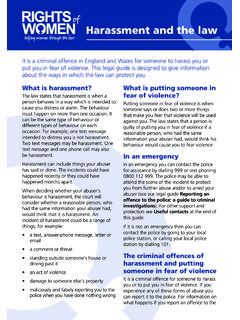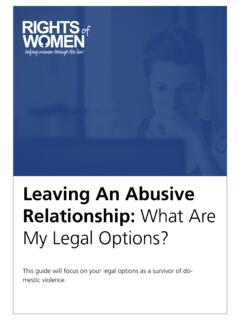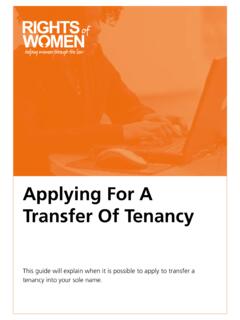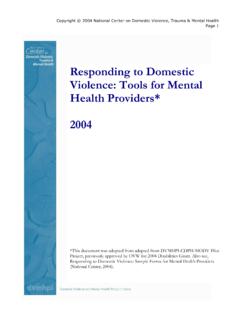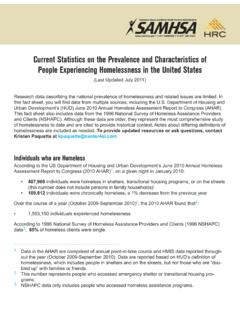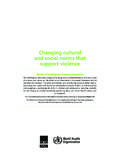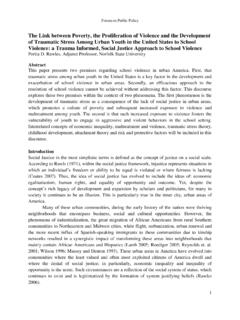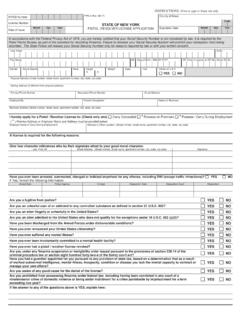Transcription of DOMESTIC VIOLENCE, HOUSING AND HOMELESSNESS - …
1 DOMESTIC violence , HOUSING AND HOMELESSNESSD omestic violence accounts for around a quarter of all recorded crime and is one of the leading causes of HOMELESSNESS for women. This guide sets out your HOUSING rights if you are experiencing DOMESTIC violence and are currently living with your abuser. It also looks at the legal options which are available if you can no longer stay in your home and need to find somewhere else to is no legal definition of DOMESTIC violence in the law of England and Wales.
2 It can include any violence or threat of violence that takes place in or outside the home between family, household members or partners in existing or previous relationships. In addition to physical violence and sexual abuse it may include financial, psychological and emotional abuse such as harassment, persistent letters, telephone calls, text messages or all DOMESTIC violence is directed by men against women, but it can and does occur in same-sex relationships, and in a small minority of cases, by women against men.
3 Although we refer here to the abuser as he we recognise that this is not always the can the law protect me if I want to stay in my home?The options that are available to you depend on whether you are married, in a civil partnership or living together. In addition, your rights may depend on whether you are renting or you own your home. If you are married, in a civil partnership or cohabiting with your abuser you can apply to the court for an occupation order. This is an order which decides who lives in your home.
4 It is a temporary measure which can exclude your abuser from your home. It usually lasts six months although it can be extended and will allow you time to look at other court has the power to order your abuser to pay the rent, mortgage or other outgoings when making an occupation order. If you have been forced out of your home you can also apply to the court to get back is a complex area of law and you should see our Guide to DOMESTIC violence and the Law, call our advice line or contact a solicitor for further you own your home or are renting and the tenancy is in your name and you are not married then your abuser has no legal right to remain in the property and you can request that he.
5 If you rent your home with your abuser and the tenancy is not in your name (or if it is in your joint names) you can apply to the county court under Part IV Schedule 7 of the Family Law Act 1996 for the tenancy to be transferred into your sole name. This type of order is called a Part II Order . You can make an application under this section if you are married or civil partners (provided you have started divorce/dissolution proceedings), or if you are living together. The court can order the person to whom the tenancy is transferred to pay money in respect of rent to the other the tenancy is an assured shorthold tenancy you will not be entitled to make this application so you will need to check what sort of tenancy you deciding whether to make a transfer of tenancy the court must consider all the circumstances including.
6 L the circumstances in which the tenancy was grantedl the circumstances in which either of you became tenantsl the HOUSING needs and HOUSING resources of you/any relevant childl your financial resourcesl the likely effect of any order on the health, safety and wellbeing of both of you and any relevant childl the conduct of both of youl your suitability as tenantsIf you are cohabitants and only one of you has a right to live in the property, the court will also consider:l the nature of the relationshipl the length of time you lived togetherl whether there are childrenl the length of time since you stopped living togetherYou can apply for this order whether you are renting privately or whether you are a local authority you want to remain in your home but you are concerned about the security, you should contact your local authority to see if they operate a sanctuary scheme in your area.
7 The purpose of this scheme is to help prevent victims of DOMESTIC violence from having to leave their homes by providing them with additional security measures including a safe room in their home. This involves a room fitted with safety measures such as extra locks, closed circuit television, security lights and a direct alarm through to the police. You will need to check with your local authority to see if they offer this service. This scheme will only be set up if you request it and if your abuser no longer lives in your home.
8 If you are at high risk this may not provide sufficient protection for transferIn certain circumstances local authorities are able to do emergency transfers. You will normally require a statement from the police confirming that you are at risk and that you must be moved. Because local authority allocation schemes vary, you should contact your local authority HOUSING officer about this are my rights if I leave my home because of DOMESTIC violence ?If you leave your home because staying there will lead to DOMESTIC violence and you do not wish to return, the local authority may have a duty to help you under Part VII of the HOUSING Act 1996 (HA1996) and the HOMELESSNESS Act duties of the local authority vary depending on whether you meet certain criteria are that you.
9 L are unintentionally homelessl are in priority needl are eligiblel have a local connectionIt may have a duty to provide you with accommodation or you may only be entitled to HA 1996 DOMESTIC violence is defined as violence from another person or threats from another person which are likely to be carried out . This includes actual violence and threats of violence and includes violence inside or outside the home. There is no need for violence to have already taken place. The HOMELESSNESS Code of Guidance 2006 makes it clear that DOMESTIC violence is not just physical violence and specifically states that it should be understood to include threatening behaviour, violence or abuse (psychological, physical, sexual, financial or emotional).
10 Local authorities must have regard to the Code of Guidance before making a decision and cannot require proof of DOMESTIC violence before they will local authority will have a duty to help you if you are homeless or if you are threatened with HOMELESSNESS . Threatened with HOMELESSNESS means that you are likely to become homeless within 28 days. You can still be considered homeless if you are living in a refuge or if you have a home but it is likely that you will experience violence or threats of violence if you will be considered unintentionally homeless if someone has used or threatened violence against you and you have been forced to leave your home because of DOMESTIC will be considered in priority need if you.



